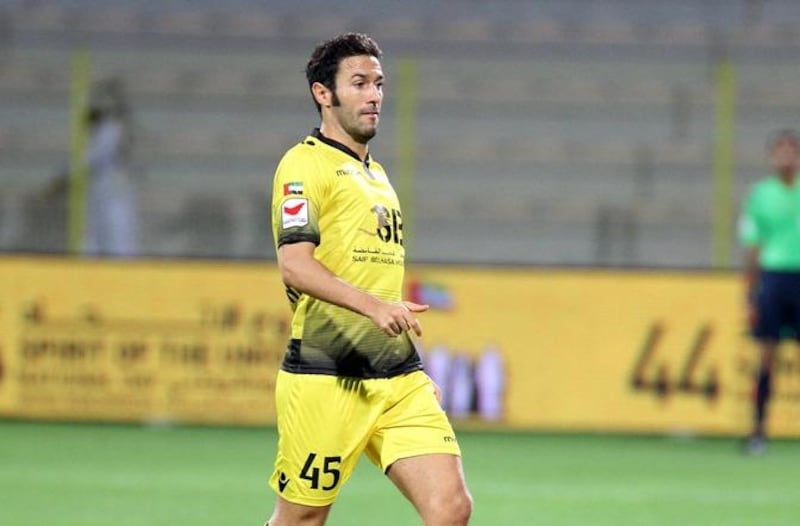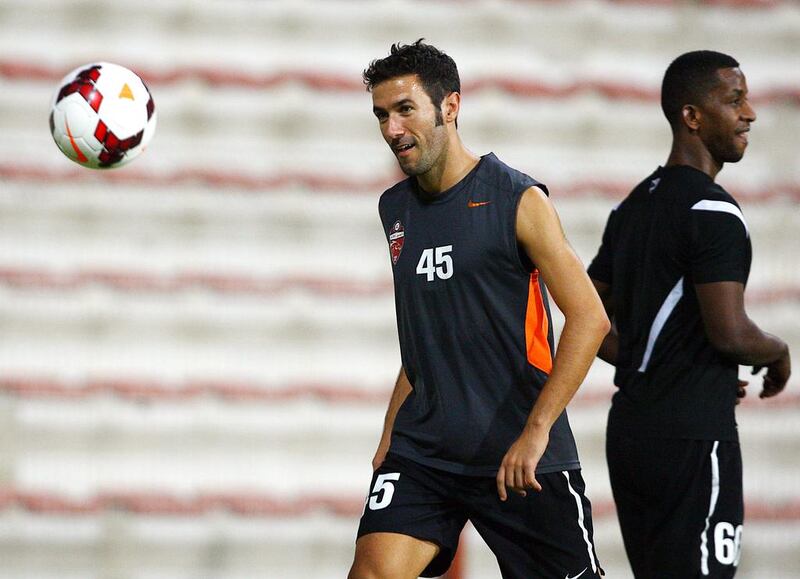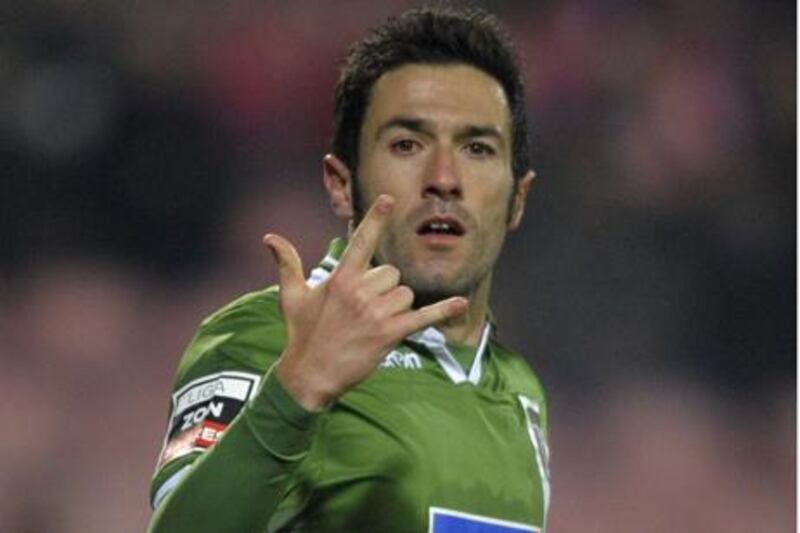Hugo Viana was preparing for a match when he learnt a former teammate had taken his own life.
It was November 27, 2011 and the Portuguese midfielder was getting ready for Braga’s crucial Portuguese league encounter with Porto at the Estadio do Dragao.
Crucial, in a footballing sense. Then he discovered the news. Instantly, the game became irrelevant, inconsequential, infinitesimal.
“I saw it on the internet,” Viana says. “Just shock. I think everyone was surprised by that horrible thing. No one could expect that.”
No one could believe it. Gary Speed, one of the most consistent performers of the Premier League era and carving a promising career in management with the Wales national team, had been found dead at his home. He was 42, married and a father of two.
Viana took a while to grasp the news. Speed had been a huge influence during their two seasons together at Newcastle United, initially when Viana arrived in England from Sporting Lisbon in 2002, age 19 and burdened by the reported €12 million (Dh46.6m) the club had paid for Europe’s Young Player of the Year.
So he looked to Speed for guidance, for advice on how to cope with the transition, the pressure and the price tag. That is why he felt obliged to respond that day at Porto. Immediately after Braga’s 3-2 defeat, Viana removed his jersey to reveal a T-shirt that simply read: “Gary — Rest In Peace”.
Read more: Find all of The National Sport's long reads in one place
“It was also for his family and friends,” Viana says now, sitting inside the Zabeel Stadium, home to present employers Al Wasl. “Gary was a very good guy, very mature, very responsible. He was a top professional player and also a top man. From his career, you’d never expect he would make something wrong in his life.
“I learnt a lot from Gary. I think he knew he wasn’t the best player technically, but as a worker he was unbelievable. Every time the first person inside the dressing room, the first player for work, first player to go gym.
“He was an amazing person. Football lost not only an unbelievable professional, but also a person.”
Speed is one of the reasons Viana looks back at his Newcastle career with relative fondness, despite the ultimate disappointment. It had been a difficult adaptation; Viana grew up in Barcelos in the north of Portugal, but was still a teenager when he relocated to England’s north-east. He did not know the language or the culture, and had only his mother for company.
His girlfriend Raquel, now his wife, followed six months later, but the move was still tough. At the beginning, Viana struggled to converse, be it in a supermarket or a restaurant. Everything just felt different.
“Even the first week driving a car,” he says. “Oh, my God ...”
Bobby Robson helped smooth the road, though. The Newcastle manager had coached in Portugal with Sporting and Porto and therefore provided a sounding board in Viana’s native tongue. But, still, Viana’s ability to strike up friendships with teammates was slowed by an inability to communicate.
“The most difficult thing was the language,” Viana says. “For the first six months I didn’t know any English, so I heard my name and didn’t know what they were saying about me.
“And I wasn’t prepared for the English mentality. When you’re injured in England it’s normal to play in the second team to get fit for the next game. But in Portugal, when you go to the second team it means you’ve been demoted. So I wasn’t prepared. I had some problems with that.”
AGL talking points: Al Jazira need to shape up fast following Abel Braga's exit
At least he had Robson. The former England manager’s knowledge of the Portuguese league had convinced Newcastle to spend big on Viana, so they drew up a five-year contract, identifying him as not only the future of the Portugal national team, but of a Premier League side with aspirations to compete for the top prizes in Europe, too.
Robson played the father figure, especially in those first few months.
“He was a very important person for me,” Viana says. “First, an amazing, amazing person, then an incredible coach also. Because he spoke very good Portuguese, he helped a lot with everything inside the club.
“And all the time he told me he didn’t expect me to play very, very well for the first three or four months. He said ‘we have time, we signed you for five years, we know your value, enjoy when you play and just try your best. Don’t worry, don’t feel the pressure’.”
Viana quickly found that was easier said than done.
“But, of course, it’s impossible not to feel the pressure when you go to the game at St James’ Park,” he says. “The stadium is full, the fans are crazy for football and for the club. Even when you are outside, the fans recognise you, but you are happy when they come to ask for an autograph or a photo. That gives you motivation to work more and gives you confidence also.”
Confidence boosted, Viana began to settle in his new surroundings. His playing time increased as the season evolved, the highlight coming when his free kick in the final home game of the campaign found the back of the Birmingham City net. It sealed Uefa Champions League qualification.
Video: Ali Makbhout scores one of the most wonderfully tricky goals of the year
In his second season, however, Viana failed to make a significant impact. The presence of Speed, Jermaine Jenas and Kieron Dyer in central midfield meant he regularly played out of position, stationed on the wing despite not possessing the pace to succeed there. So, still only 21, Viana resolved to solve his predicament.
“I spoke to Bobby Robson and he understood and told me he would give me more chances in the middle,” he says. “But Gary Speed was amazing, so it was impossible for me. I think it was my fault also. I was young and not ready for such a big change. So I moved to Sporting again.”
Viana went back to Lisbon on loan, then transferred to Valencia in 2006 and spent a frustrating spell on loan at Osasuna. He rekindled his career at Braga in 2009, when the club finished second in the league — their best ever finish — although they lost the title to Benfica on the final day.
The following season, as Viana’s role increased, Braga went to the Europa League final, only to lose 1-0 to Radamel Falcao’s Porto. In 2013, he won the Portuguese League Cup.
His success alerted Al Ahli, who sought a playmaker to help them take the next step. The Dubai club had lifted the League Cup and President’s Cup in successive seasons, but had not lifted a league championship since 2010. So they signed Viana on a two-year contract.
He is reluctant to admit it, but his impact was immediate. Ahli won the Super Cup and the League Cup, then clinched the Arabian Gulf League title with three rounds to spare. In doing so, they accrued 64 points, a record total for the professional era. They lost only once. Key to their boon, Viana was later voted into the league’s team of the year.
“It was very, very important for the club,” he says. “To win with the points record in the league and to lose only one game made it a distinctive mark for Al Ahli.”
Steve Luckings: Stop the ride! I want to get off! Newcastle's rollercoaster season shows no signs of slowing down
However, then came the shock. That July, only two months after hoisting the top-flight trophy, Ahli recruited Mirel Radoi, the Romanian who had been coach Cosmin Olaroiu’s lieutenant at Steaua Bucharest, Al Hilal and Al Ain. He was also a direct replacement for Viana. Acclaimed as one of the league’s best midfielders the previous season, now he was searching for new employment.
“That was a little surprising,” Viana says. “But just a little, because many people spoke before the season finished that Cosmin would like Radoi to join. If it was fair or not, I don’t know and I don’t care, but it’s football. The owner and the coach of the club together can do whatever they want. So we have to accept it.”
Not surprisingly, Viana had options. He eventually chose Wasl, signing shortly after the summer transfer deadline in October last year. Yet the Football Association rescinded their extension to the window, and an issue that soon involved Fifa and threatened to go to the Court of Arbitration for Sport (Cas) concluded with Viana missing the first half to the 2014/15 season. He did not make his Wasl debut until February; in fact, there were times he questioned if he would make it at all.
“It was difficult, very difficult,” Viana says. “I was praying to play, but it was impossible. When you have an injury, you accept it and have to adapt, but that situation wasn’t an injury, wasn’t a fair moment for me. But you have to adapt to any situation in football.
“So I set goals to get through the three or four months without playing: training hard every time, working more than your colleagues, every month trying to get better. If you don’t, you can disappear, because four months is too long.”
Caio Canedo: 'Al Wasl have to fight at the top' as sleeping giants lay out ambitions
Viana made his mark upon his return; he thrived. Dictating play in midfield, he helped Wasl grow into one of the league’s most entertaining sides, taking their tally to 53 goals, third highest in the league. Having begun the season badly, Wasl were defeated only three times in 13 matches once the league resumed and eventually climbed to sixth.
Perhaps with Viana available from the onset, and working in tandem with the prolific triumvirate of Fabio Lima, Caio and Ederson, Wasl could have expected even more. Typically modest, Viana rejects the theory.
“I cannot agree with that because I’m not a player who scores many goals,” he says. “Maybe Fabio, Caio, Ederson, if last season they were out for four months we can say that. My colleagues, the foreign players and the locals, they were amazing. One player cannot change everything and especially not a midfielder.
“OK, I help, but I don’t decide matches. The forward players live to score, and we have the pleasure to work for them and we’re happy for that opportunity.”
There is a belief at Wasl that opportunity knocks this season. Ederson is gone, but he has been replaced by Edgar Bruno and the other foreign players remain.
After 11 matches, Wasl are fourth in the table, three points off third with a game in hand. Gabriel Calderon has continued the fine work from last season and the seven-time UAE champions, without a top-flight title in eight years, are starting to think big again. So, too, are their typically expectant supporters.
Cosmin Olaroiu: Al Ahli have to give Moussa Sow time to get fit, gain confidence and improve
“Al Wasl has a huge number of fans here in the UAE,” Viana says. “We can feel that inside the pitch, that they want to win something, that the team plays good every time. And the pressure is all the time with us. But we’re prepared to receive that pressure and to live with it. For us, it’s not a problem. Pressure can even be a good thing, it can motivate.
“There is a lot of happiness here. Almost everybody knows each other from last year, we’re closer to one another, much better. Al Wasl’s not a team that people think can be champion of any competition, but inside the dressing room we have that dream this year that we can do something serious for the club and for the fans.
“The league is difficult to win, but we want to finish in the top four, for sure. And to give a good performance in the Arabian Gulf Cup and the President’s Cup. We’re better prepared than last year.”
So no slowing down, no taking it easy as he moves towards the final few years of his career. Viana, 33 next month, jokes with Raquel that he now represents one of the old guys in the squad, no longer the young teenager who stepped into the unknown at Newcastle. He is happy in Dubai, doing the everyday things like taking his children, Sara, 10, and Hugo, 5, to school in the morning, trying to live as ordinary a life as possible.
“My wife and I don’t make extravagances or anything like that,” says Viana, whose only tattoos are inked on his wrists, bearing the names of his children and the dates they were born.
“Reminders,” he says. “People have that image of footballers, but I’m not like that. The adaptation to Dubai for my wife and kids has been perfect. We’re normal, normal people. We’re very happy here.”
[ jmcauley@thenational.ae ]
Follow us on Twitter @NatSportUAE
Like us on Facebook at facebook.com/TheNationalSport








